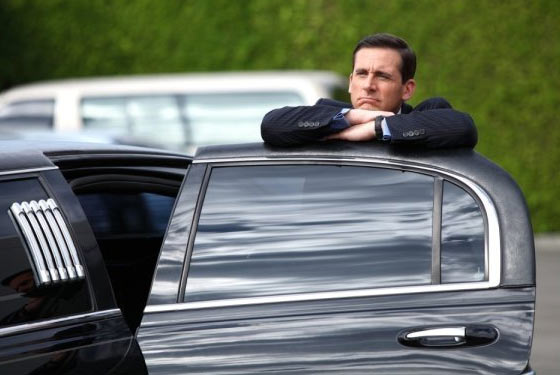
As weÔÇÖve said before, as a general rule, the less Michael Scott is a Homer SimpsonÔÇôesque boob, the better The Office becomes. On a fundamental level, we have to at least respect Michael as a boss, as someone competent enough to keep a branch afloat during difficult times. You have to see how he possibly became a boss in the first place.
But if Michael Scott ÔÇö Michael Scott ÔÇö is the lone Dunder Mifflin manager whose branch is making a profit (and itÔÇÖs not like weÔÇÖre regularly seeing the rest of the Scranton staff putting its proverbial nose to the grindstone), then itÔÇÖs no wonder that Dunder Mifflin is being protested by its stockholders. Forget the notion that a regional paper company would have inherent problems: This appears to be the worst-run corporation on earth.
And so, at the stockholder meeting, we find Bumbler Mifflin protesters, and screaming stockholders, and a ÔÇ£former CongressmanÔÇØ flitting ominously around the proceedings: This is a company whose plummeting stock price has drawn media attention in the worst possible way. How desperate does a company have to be to bring Michael onstage with them?
Michael, being Michael, ends up taken aback by all the hostility ÔÇö he is not a man who handles being booed well ÔÇö and does everything he can to win the crowd back, ultimately telling them he has a 45-day, 45-point plan to ÔÇ£fix this.ÔÇØ Michael still doesnÔÇÖt understand whatÔÇÖs wrong, doesnÔÇÖt understand that Dunder Mifflin doesnÔÇÖt have a plan at all, and is taken aback when the Dunder Mifflin brass (including the crusty, bullshitting CEO) is angry with him. The shareholders were pissed, and now theyÔÇÖre not, Michael claims ÔÇö what could I possibly have done wrong?
Amid all this, the show continued to confound expectations in inventive ways. A subplot involves OscarÔÇÖs frustration with Dunder Mifflin, and his insistence that he understood the source of the companyÔÇÖs problems. But when Michael calls him up to ÔÇ£explain the numbers thingÔÇØ to the company CEO and executive board, Oscar clams up and slinks away. A lesser show gives Oscar some big redemptive moment there: The Office plays it much like it would actually play, awkwardly and emptily, with a man afraid to offend the people who pay his salary. And sometimes, no one has the answers anyway.
By the end, while the Dunder Mifflin execs take their public beating, Michael and the gang are sprinting out of the meeting to take their limo ride back to Scranton, the happy proletariat dabbling in rich-guy land before heading home, aware that the partyÔÇÖs almost over. With everything we saw of Dunder MifflinÔÇÖs corporate structure, we have no reason to amend our prediction of last week: This company is going down. Soon.
More Recaps:
Alan Sepinwall points out that David Wallace ÔÇ£is clearly not remotely as smart as he and the other characters want to think he is.ÔÇØ
Leonard Pierce at the A.V. Club says the episode ÔÇ£managed to nicely convey how both ends of the Dunder-Mifflin corporate chain ÔÇö the workers and the managers ÔÇö are dysfunctional in their own way, which is why nothing seems to get done to put the company back on track.ÔÇØ
Margaret Lyons at EW.com didnÔÇÖt think the episode ÔÇ£brought out the best, funniest parts of any of our characters.ÔÇØ


